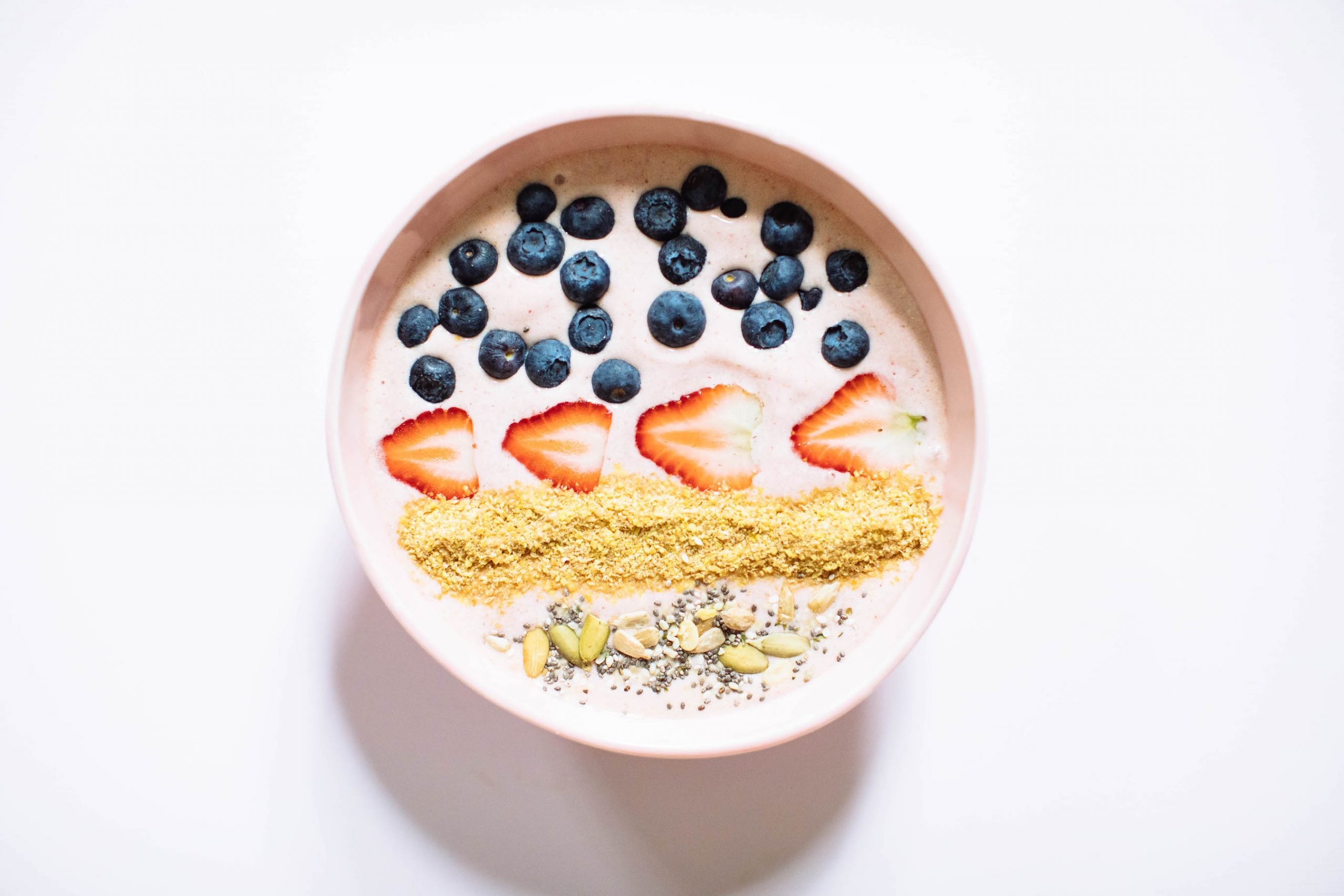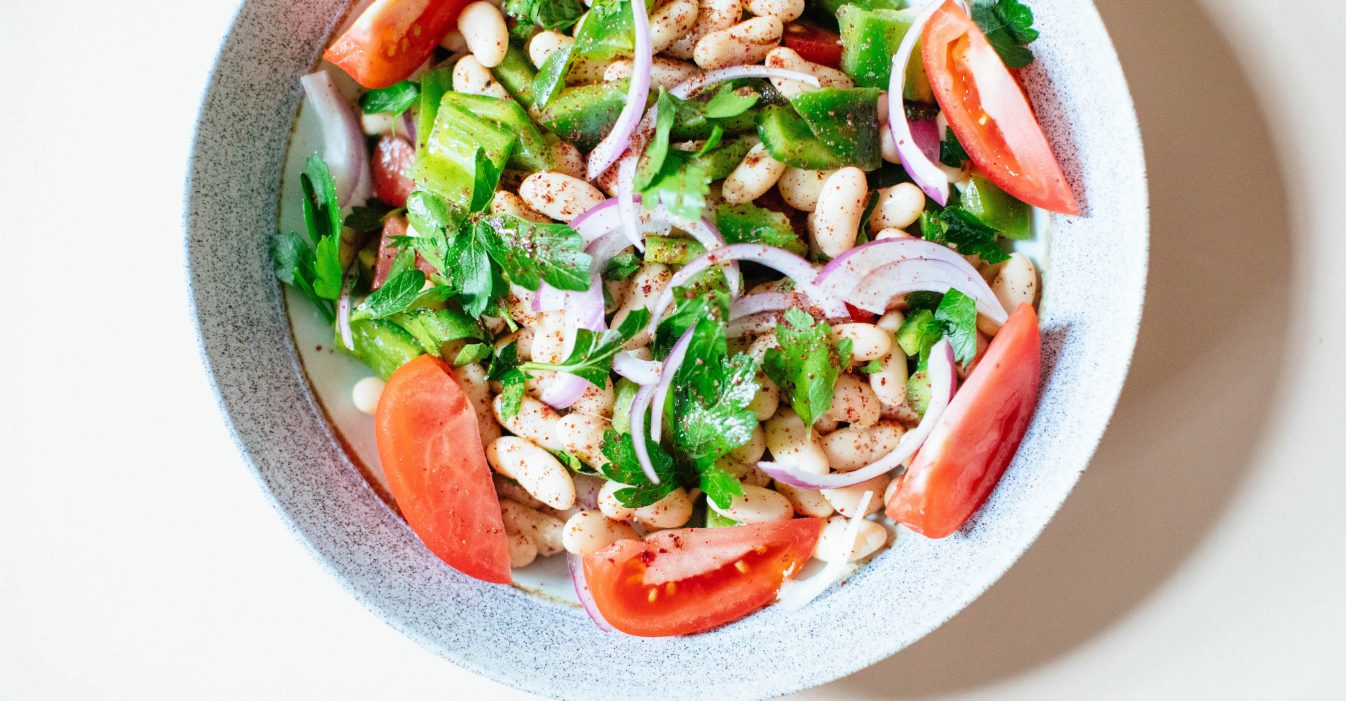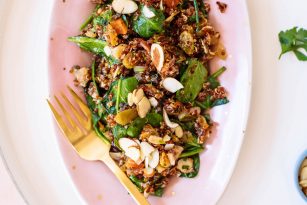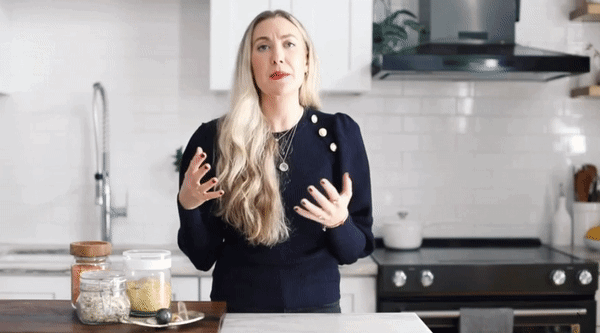Whether you’re looking to eat more plant-based, whole foods or you’re looking to fully transition to eating a vegetarian or vegan diet, we can all benefit from eating a diet that’s abundant in plants!
A plant-based diet is comprised of natural, real ingredients that are packed with vitamins, minerals, fiber and nutrients to nourish your body from the inside out.
Maintaining a whole-food, plant-based diet reduces your chances of developing chronic disease, increases your overall health and well-being while also benefiting the environment.
In this guide, we’re sharing the knowledge and tips you need to easily incorporate more of these powerful plant-based foods into your meals!

What Does it Mean to Eat a Plant-Based Diet (and is there anything you can’t eat)?
A plant-based diet focuses on whole foods and the base of diet is, well, plants!
It doesn’t have mean you’re “vegan” or any other label (unless you want it to).
Plant-based diets, or those centered around plants, can look different for each of us. We may choose to practice a vegan, vegetarian, pescatarian and omnivore diet, and we could all be plant-centric in our meals.
When you’re eating plant-based, or plant-centric, you’re focusing on plants, but you may not always eliminate animal products from the equation — you find the equation and amount that feels right for your body, your health, and your lifestyle. In a plant-based diet, you’re placing whole foods above all else, and reducing processed foods in the process.
Any lifestyle that makes plants the focal point of all meals is plant-based.
There’s a difference between a plant-based diet and a vegan diet although these two are often used interchangeably — or incorrectly mistaken for the other. A vegan diet is often defined as not just a way of eating, but as a way of living which seeks to exclude, as far as is possible and practicable, all forms of animal products (food, clothing, etc.) and honey. At
NS, our food philosophy is rooted in plants, but we don’t label our philosophy in one way because that’s not what we’re about!
We help you eat more of these nutrient-dense, whole foods that are so beneficial to your health, but you’re still able to enjoy all foods and learn how to incorporate (or not) aspects of this information into your own life.
Here are a few of the principles of a plant-based diet:
Eat a Wide Variety of Plant-Based Foods
Plant-based means exactly that — the basis of your diet is coming from plants, the emphasis is on the plants. That may be fruits, vegetables, whole grains, healthy fats, beans, legumes, nuts, nut butter or seeds. The degree to which you fill your plate with plants is completely up to you.
For nutrition purposes, the more color you have – the better! The colors of plant-based foods are a result of the pigments that are naturally present in the food items. Chlorophyll (green), flavonoids (yellow, red, blue and purple), carotenoids (orange, red, yellow and pink) and betalains (red, violet) are all responsible for different colors and corresponding nutritional benefits.
Mimic the rainbow on your plate whenever you can to ensure you’re getting a wide range of pigments, and therefore vitamins, minerals, antioxidants and nutrients!
Mindful Consumption of Animal Products
Maintaining a plant-based diet also implies the mindful consumption of animal products. Some may choose to include animal products, and others may not.
For those who do, choosing wholesome sources of animal protein that have been raised ethically is optimal. Looking for organic, cage-free, and antibiotic-free products will help you to do just that!
When it comes to animal products, reaching for lean protein as much as you can will also improve the health benefits of a plant-based diet. Think grass-fed lean beef, organic chicken breast, turkey, eggs or pork loin.
Find Enjoyment and Satisfaction from Whole Foods
Another key principle of plant-based eating is enjoying the foods you’re making.
Yes, these foods can provide us with so many nutrients, but that doesn’t mean you sacrifice taste and enjoyment of your meals.
So when you’re eating plant-based, you want to eat a variety of foods and also learn how to make them more enjoyable and satisfying to you, which may look like developing a few cooking skills or learning how to play with flavor profiles. Vegetables don’t have to be boring or bland! It’s all about developing the skills to really know how to master these ingredients and make them nutrient-dense and delicious at the same time.
If you’d like some beginner-friendly plant-based meals, download my free guide to creating healthy eating habits, where I share the Nutrition Stripped Community’s top five favorite recipes!
Benefits of a Plant-Based Diet
A plant-based or plant-centric diet includes whole plant foods that are abundant in nutrients such as vitamins, minerals, dietary fiber, antioxidants, phytonutrients, and healthy fats.
This balance of nutrients found in many whole foods can help us live healthier lives in various different ways!
Simple Nutrition for Meals
One of the top benefits of plant-based eating is how easy it is to incorporate into your life and simplify nutrition and healthy eating.
There are so many diets and trends out there, but at the end of the day, it comes down to eating a variety of whole foods and also learning how to practice balance. This often makes it so much easier for people to maintain than 30-day diets or plans, because the focus is on adding more of these powerful foods to their plate, rather than avoiding foods.
We use a simple visual check system here at Nutrition Stripped for a balanced, plant-heavy meal, called the Foundational Five. It’s a quick system that helps you create a nutrient-dense meal every time, with a focus on plants, but with the freedom to add other foods as well.
Consistency in healthy eating is what has the power to care for our health and wellbeing, so focusing on long-lasting and simple practices is key.
Improve Heart Health
By eating a plant-based diet, you can reduce your LDL cholesterol as well as total cholesterol while increasing HDL cholesterol.
To give you a little context, LDL cholesterol is commonly referred to as the “bad” cholesterol while HDL cholesterol is the “good” cholesterol.
This combination of adjustments helps to increase your heart health and prevent the incidence of damaging and possibly fatal cardiac events in the future (1). It has also been shown to prevent the occurrence of heart disease (2).
Not just cholesterol, but blood pressure can also be significantly improved through the adoption of a plant-based lifestyle. On average, those maintaining a plant-based diet comprised of whole, nutritious foods have lower systolic and diastolic blood pressure (3).
Manage or Prevent Type II Diabetes
Whether you have already been diagnosed with type II diabetes or are simply looking to prevent it, a plant-based diet can be used to both manage and prevent diabetes.
With an emphasis on plants, a plant-based way of eating results in an increase of both soluble and insoluble fiber intake. Fiber is responsible for slowing the rate of digestion and contributing to the stabilization of blood sugar.
Additionally, a whole-food, plant-based lifestyle results in the reduction of processed food intake as well. This undoubtedly results in a decreased intake of refined and processed sugars. When consumed regularly, refined and processed sugars result in perpetual blood sugar spikes and insulin resistance over time. Both of which are associated with the development of diabetes.
Ultimately, research has shown time and time again that plant-based eaters are at a lower risk for developing type II diabetes. Specifically a 34% lower risk than those living a non-plant-based lifestyle (4, 5).
Reduce Cognitive Decline
Plant-based food items are packed with antioxidants, compounds that are frequently associated with a decrease in cognitive decline.
When we say cognitive decline, we’re referring to disease states such as dementia or Alzheimer’s disease.
Plant-based diets with higher concentrations of fruits and vegetables lead to a reduction in cognitive decline and therefore decreased chances of developing dementia or Alzheimer’s disease (6, 7).
Nourish The Microbiome
Prebiotics are essentially food for the healthy bacteria found in the gut microbiome. Prebiotics are essentially carbohyrates that your body cannot digest, they’re found in plant-based products such as fruits, vegetables and whole grains.
By consuming a plant-based diet, you are nourishing your microbiome and providing the healthy bacteria with the fuel it needs to grow. (8)
Normalize Digestion
The average adult only consumes about 15 grams of fiber per day. In contrast, women should receive at least 25 grams per day and men 35 grams per day.
A plant-based diet is packed with fiber, both soluble and insoluble. For those struggling with irregular digestion patterns, a plant-based diet can help normalize their digestion.
With that being said, it’s important to gradually increase fiber intake over time. A significant, sudden increase in fiber can result in just the opposite.
Positively Impact The Environment
Not only is a plant-based diet good for your personal health — but it can help positively impact the environment by reducing your carbon footprint.
As opposed to an animal-based diet, a plant-based diet results in reduced water and land usage as well as a reduction in pollution. Over time, this could make a significant impact on the state of our environment (9).
What You’ll Eat on a Plant-Based Diet
As you’re getting started with plant-based eating or refining your skills, the Foundational Five is a great tool to use when building your plate.
This outline depicts all of the meal components that should be included at mealtimes.
Protein
First up, we have protein. This may be a plant-based form of protein such as quinoa, beans, legumes, edamame, nuts or seeds. It could also be a lean source of animal protein such as organic chicken breast, turkey, pork loin or eggs if they are a part of your lifestyle as well.
If you’re wondering how to get enough protein when eating more plant-based and reducing animal protein, check out this blog and video on 10 plant-based proteins you should try!
Protein is involved in digestive health, rebuilding tissue and muscle, energy, hormonal production (ex. growth hormone), immune health as antibodies, enzymes (ex. phenylalanine hydroxylase), structure, and storage/transportation of other molecules (ex. ferritin). Protein is part of every single cell in our body.
It’s safe to say it’s important!
Fat
This is where your satiety comes from. Fat is also important for the absorption of fat-soluble vitamins (vitamins A, D, E and K). These are the vitamins that care for you hair, skin, and nails! You can use things like extra virgin olive oil, avocado oil, nuts, seeds, olives or avocados.
The more plant-based sources of fat, the better. These tend to be higher in unsaturated fats that support heart health.
Starchy Carbohydrates
Carbohydrates fall into two major categories: starchy and nonstarchy.
Starchy carbohydrates include whole grains such as brown rice and quinoa. They also include certain vegetables like peas, corn, and potatoes as well as fruit.
These sources of carbohydrates give you more energy than non-starchy carbohydrates.
Non-Starchy Carbohydrates
When you hear non-starchy carbohydrates, think of vegetables. Broccoli, Brussels sprouts, romaine lettuce, cucumbers – you name it and it’s nonstarchy.
These forms of carbohydrate are packed with vitamins, minerals, fiber, and water – the more you have in your diet, the better!
Flavor Factor
Lastly, we have to make all of this taste good when combined. The flavor factor might be a red sauce you made or your favorite dressing like this creamy turmeric dressing.
Use herbs and spices and spices to liven up your dish and make it your own!
What You Need to Know About Nutrition When Eating a Plant-Based Diet
There are a few key components to keep in mind when making food choices and decisions within a plant-based lifestyle.
Know Where to Get Key Nutrients That Typically Come from Animal Protein
There are various nutrients that are most commonly found in animal-based products. When maintaining a plant-based lifestyle, it’s important to keep these nutrients in mind.
Vitamin B12, iron, zinc, vitamin D, and calcium are the most common nutrients of concern. To learn more about how to consume adequate amounts of these nutrients on a plant-based diet and whether or not you’ll need to add a supplement, head here!
Processed Plant-Based Foods to Watch
There are quite a few products and food items out there that are marketed or displayed as plant-based that aren’t necessarily whole foods.
Let’s start with the plant-based meat category. These products appear to have swept the nation with the blink of an eye within the past year or so.
They’re made completely of plant products and void of any animal products, which means they must be healthy, right? Not exactly.
These imitation meats are very highly processed, and they don’t contain any whole foods.
The plant-based diet we’re talking about here is one based on whole foods, not processed ingredients. When looking at nutrition labels for packaged goods labeled as plant-based, look for ingredients you recognize.
If you see “Plant-Based” on the front of the package but don’t see a single fruit, vegetable, whole grain, nut, or seed listed in the ingredients, that’s a red flag.
Tips for Starting Your Plant-Based Diet
New to plant-based eating? Here are some first steps you can take to get started!
Take It Slow
First and foremost, take baby steps. In order to make a long term lifestyle change, slow and steady wins the race.
Start by increasing your vegetable intake slowly but surely, then add in some additional fruits and maybe some whole grains.
Once you’re starting to get comfortable with this increase of whole foods, then you can start to address the animal-based food items in your diet. Ask yourself; are there some things you’d like to go without? Others you just can’t live without? Then go from there!
Making a significant lifestyle change such as this may require some additional support. Don’t hesitate to reach out to a registered dietitian to guide you through the process.
Invest in a Few Kitchen Essentials
Often times living a plant-based lifestyle means more time spent in the kitchen. If this is the case for you, start to familiarize yourself with your kitchen and kitchen tools.
There are a few kitchen tools that are commonly used in plant-based recipes and cooking that you’ll want to invest in for your kitchen.
A few common ones that you’ll find used throughout Nutrition Stripped recipes include:
- A Vitamix Blender which is ideal for blending nut-based cheeses, sauces, and dips along with smoothies, soups and the like!
- Non-Toxic cookware, like The Always Pan, that makes it easy for you to whip up meals throughout the week
- Glass-Lock Food Storage Containers for storing prepped items and keeping your food fresh
- A Chef’s Knife for chopping, slicing, and dicing all of your fruits and veggies!
These are some of the tools that will support you daily in the kitchen and help make you a little more efficient so you can enjoy the process.
Stock Your Pantry with Plant-Based Foods
You’ll also want to stock your pantry with a few plant-based staples so you can create delicious plant-based meals without feeling lie you don’t have the right ingredients on hand.
Here’s a couple things to think about stocking in your pantry. I recommend first stocking the pantry with the things you know and love and trying maybe 3-5 new ingredients that you think you’ll like, or that you’ve tried before but haven’t ever cooked with yourself! That will give you a fun balance of tried and true and new and exciting.
- Nuts
- Seeds
- Nutrition yeast (this is packed with B-Vitamins plus it gives you a delicious cheesy flavor!)
- Grains
- Gluten-free flour
- Plant-based Protein
Some of our recommendations for these products are linked in the NS shop if you want more specific recommendations!
Build A Rainbow
Try and have some variation on your plate as much as you can. The more color, the more nutrients.
Sometimes starchy carbohydrates are the most familiar when you’re going through this transition. While these carbohydrates are still great, don’t forget to add in those fruits, vegetables, nuts, seeds, and legumes as well.
I promise your digestion and health will thank you!
Utilize Plant-Based Alternatives to Animal-Based Products
There are so many great products out there that can give you the same taste, texture and mouthfeel as traditional animal-based products.
Dairy is a particularly popular category for this! From dairy-free cheeses to yogurts, dressings and milks, you have so many different options for alternatives.
There are also naturally plant-based products that have the ability to mimic the taste and texture of animal-based products when properly prepared. Tempeh and tofu are two great examples of this. Check out our guide to preparing protein to see exactly what we mean!
Easy Plant-Based Diet Meal Plan
Now that we’ve got the basics down, let’s go through a sample meal plan! You can use the recipes linked below to get started.
Breakfast
Crispy Homestyle Breakfast Potatoes
Lunch
Chickpea Curry With Turmeric Rice
Snack
Dinner
Sweets
Double Dutch Chocolate Cookie Skillet
The Bottom Line
Plant-based eating is a great way to improve your health and support the environment. It’s a lifestyle that you can tweak and alter so it’s unique to you and your individual needs.
Connect With Us!
We would love to hear about your experience with plant-based eating. Have you tried it before? Is this your first venture into the plant-based world? What are some of your favorite plant-based meals?
We would love to hear from you! I’m sure someone else reading this article would enjoy hearing what works for you as well. As always, you can connect with us on Instagram via @nutritionstrippederica, @nutritionstripped, #nutritionstripped.









